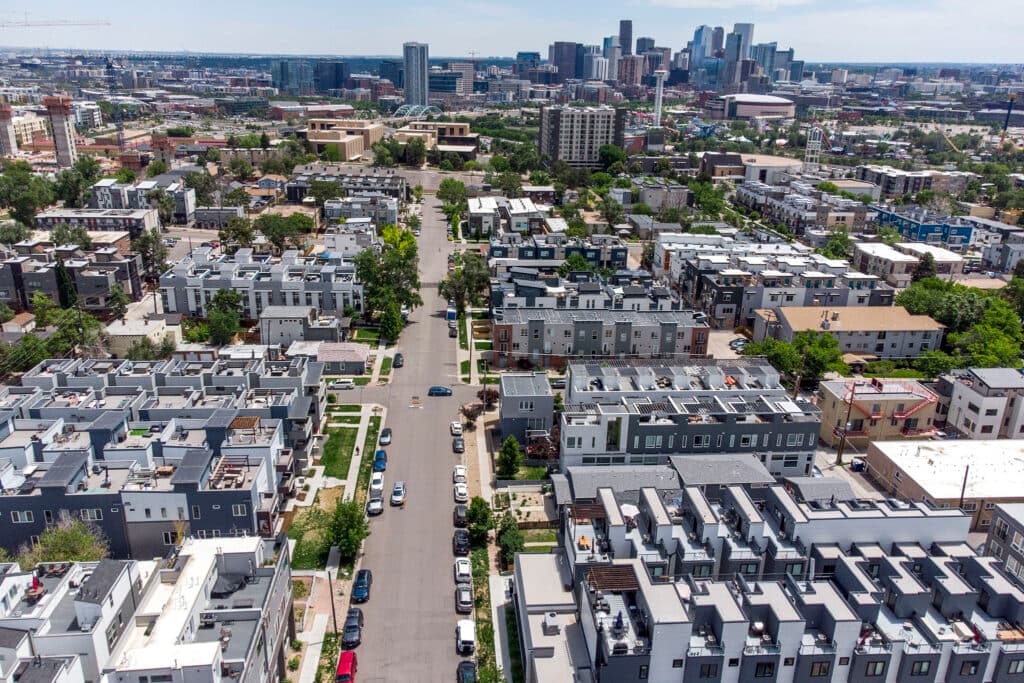More Denverites say their city is doing better now than they did in August 2023.
Nearly three-quarters of Denverites say they feel safe in the city — and that number has risen over the past year.
A majority of residents are not particularly concerned about the revitalization of Downtown Denver, with 55 percent not viewing it as a top priority.
Residents continue to be concerned with homelessness, a lack of housing affordability and crime.
All that’s according to the nonprofit Colorado Polling Institute’s bipartisan survey of 409 registered voters in Denver.
The institute now regularly surveys residents to track how voters’ perceptions of their city, leaders and pressing issues are changing.
The Democratic firm Aspect Strategic and the Republican firm New Bridge Strategy conducted the survey. The firms surveyed participants by phone and online from June 13 to 18. The poll’s margin of error is just under 5 percent.
Most residents love city services, and most are okay with paying for them.
Still, for 35 percent, Denver taxes are “way too high.”
Another 29 percent said they’re “high but acceptable.” And 35 percent said they were “about right” or “lower than one would expect.”
This is the first time the Colorado Polling Institute has asked about attitudes toward taxation. The questions come months ahead of the November election when Denver voters will likely be weighing two sales-tax increases.
One, already on the ballot, asks for more funding for Denver Health. The other, making its way through City Council, would fund the creation of 44,000 new units of affordable housing.
Statewide, increasing taxes has fallen out of favor, said Lori Weigel of New Bridge Strategy.
How that’s playing out in Denver, where voters have raised sales taxes by more than 30 percent over the past few years, is unknown.
Still, 65 percent of those surveyed are pleased with the services the local government offers and are totally satisfied with Denver as a place to live.
How do the people feel about their leaders?
Mayor Mike Johnston’s approval rating rose to 48 percent.
The number of people who were uncertain about his performance fell, and the number of those who disapproved of his leadership grew to 11 percent
Of those who think Johnston’s doing a good job, 42 percent say he’s handling homelessness well, and 18 percent say he’s getting things done, trying and keeping his promises.
“Mayor Johnston took office amid high voter concern on homelessness, crime, and the cost of living in the city, and his first year was further complicated by the influx of migrants from Central and South America,” Weigel said. “Against that backdrop, his favorability has improved slightly and voters do sense — albeit slightly — that progress is being made.”
The Denver School Board’s reputation is overwhelmingly negative, but improving over the past year. .
Meanwhile, while the Denver Police Department’s approval has fallen a bit, it’s largely remained steady.
What do people like — and hate — about Denver.
For those who love Denver, here are the top reasons they enjoy the city ranked: weather, cultural amenities and activities, friendly/nice people, proximity to the mountains, beauty, city parks and outdoor activities.
The top problems of people who have an unfavorable view of the city: drugs, crime and a lack of safety; the cost of living; homelessness and encampments; housing costs; illegal immigration; roads and infrastructure; environmental, trash and pollution problems; overcrowding; high taxes; and a lack of police funding and training.
People across the city are facing financial struggles, renters more than owners.
In total, 89 percent of renters say they feel financial strain, whereas just 45 percent of homeowners do.
Though housing affordability is cited as a significant problem for many, the economy as a whole is viewed as much better than it was 20 years ago.
New Denverites have a more favorable perspective of the city than those who have been here for more than 10 years.
“On the one hand, most voters believe Denver is a good, safe place to live with an acceptable level of taxation and decent city services,” said Kevin Ingham of Aspect Strategic. “Yet, despite largely positive personal experiences, many also see ongoing challenges, which aren’t seen as unique to Denver but nonetheless drive some worries about the direction of the city.”












